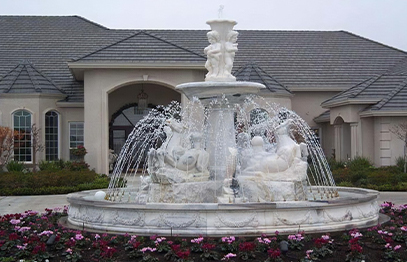12 月 . 03, 2024 16:33 Back to list
submersible water pump deep well
Understanding Submersible Water Pumps for Deep Wells
Submersible water pumps have become essential tools in modern irrigation, water extraction, and various industrial applications. These specialized pumps are designed to operate underwater, making them particularly suited for deep wells where traditional pumps may struggle. This article will delve into the mechanics of submersible water pumps, their advantages, applications, and considerations for choosing the right pump for deep well water extraction.
What is a Submersible Water Pump?
A submersible water pump is a type of electric pump that is submerged in water to extract it from deep underground sources, such as wells. The design includes a sealed motor that prevents water from entering and damaging the motor, ensuring longevity and efficiency. Unlike standard pumps that draw water upward, submersible pumps push water to the surface, which allows for better efficiency in handling larger volumes of water.
How Do Submersible Pumps Work?
The fundamental operations of submersible pumps involve a few critical components the motor, the impeller, and the discharge outlet. When the electric motor operates, the impeller rotates and generates centrifugal force, which pushes the water through the pump and out through the discharge pipe. This process requires a proper sealing mechanism to ensure that electric components remain dry, often achieved through the use of oil-filled cavities.
Advantages of Submersible Water Pumps
1. Efficiency Submersible pumps are designed to operate underwater, minimizing energy loss due to friction. They can be more efficient than other pump types, particularly for deep well applications, as they do not need to create a vacuum to draw water.
2. Space Saving Being submerged means that these pumps take up less above-ground space, making them ideal for residential and rural installations.
3. Reduced Noise Since the pump operates underwater, the noise produced is significantly lower compared to surface pumps, contributing to a quieter environment.
4. Minimal Maintenance Submersible pumps are typically robust and durable, requiring less frequent maintenance than other types of pumps. This reduces long-term operational costs for users.
5. Workhorse for Depth These pumps can function efficiently at great depths, often exceeding hundreds of feet, which makes them suitable for deeper aquifers.
Applications of Submersible Pumps
submersible water pump deep well

Submersible water pumps are versatile and can be used for various applications, including
- Residential Water Supply They are commonly employed in homes with deep water wells, supplying families with fresh water for drinking and household tasks. - Irrigation Farmers use these pumps to extract water for agricultural purposes, ensuring crops receive the necessary hydration, especially in arid regions.
- Industrial Uses Industries utilize submersible pumps for dewatering, material transfer, and managing wastewater systems.
- Environmental and Construction Applications They play vital roles in draining construction sites, managing floodwaters, and facilitating environmental monitoring by extracting water samples from various depths.
Choosing the Right Submersible Pump
When selecting a submersible water pump for deep wells, several factors must be considered
1. Depth of Well Assessing the total depth of the well and the water table level is crucial. Pumps are rated for specific depths, so ensure the chosen model can handle your well's requirements.
2. Flow Rate Determine your required flow rate based on your usage. Different pumps have different capacities, so selecting one that aligns with your needs ensures efficiency.
3. Power Source Decide on a suitable power source, typically electricity, though solar options are available for remote locations.
4. Material and Durability The pump should be made from corrosion-resistant materials, especially if it will be submerged in water for extended periods.
5. Budget Finally, consider your budget, including initial costs and ongoing operational expenses, to select a pump that meets both your financial and functional needs.
Conclusion
Submersible water pumps are vital in modern water management, especially for deep wells. Their efficiency, space-saving design, and versatility make them an excellent choice for a wide range of applications, from residential to industrial. By understanding the features, advantages, and considerations for submersible pumps, users can make informed decisions that fulfill their water extraction requirements while promoting sustainable practices. As technology advances, these pumps will continue to play crucial roles in addressing our water needs.
-
Your Guide to Deep Well Pumps
NewsOct.31,2024
-
Why Choose a Stainless Steel Deep Well Pump?
NewsOct.31,2024
-
Understanding Water-Filled Submersible Pumps
NewsOct.31,2024
-
Understanding SS Submersible Pumps
NewsOct.31,2024
-
Reliable Submersible Well Pumps for Your Water Supply Needs
NewsOct.31,2024
-
Choosing the Right Submersible Pump for Your Water Management Needs
NewsOct.31,2024
-
 Understanding Water-Filled Submersible PumpsWhen it comes to selecting the right pump for your water management needs, understanding the different types available is crucial.Detail
Understanding Water-Filled Submersible PumpsWhen it comes to selecting the right pump for your water management needs, understanding the different types available is crucial.Detail -
 Guide to Installing a Deep Well Submersible PumpWhen dealing with deep wells, a deep well submersible pump is often the most effective solution for extracting water from significant depths.Detail
Guide to Installing a Deep Well Submersible PumpWhen dealing with deep wells, a deep well submersible pump is often the most effective solution for extracting water from significant depths.Detail -
 Finding the Right Submersible PumpWhen seeking an efficient solution for pumping water from deep wells, sumps, or other applications, the submersible pump is a leading choice.Detail
Finding the Right Submersible PumpWhen seeking an efficient solution for pumping water from deep wells, sumps, or other applications, the submersible pump is a leading choice.Detail
